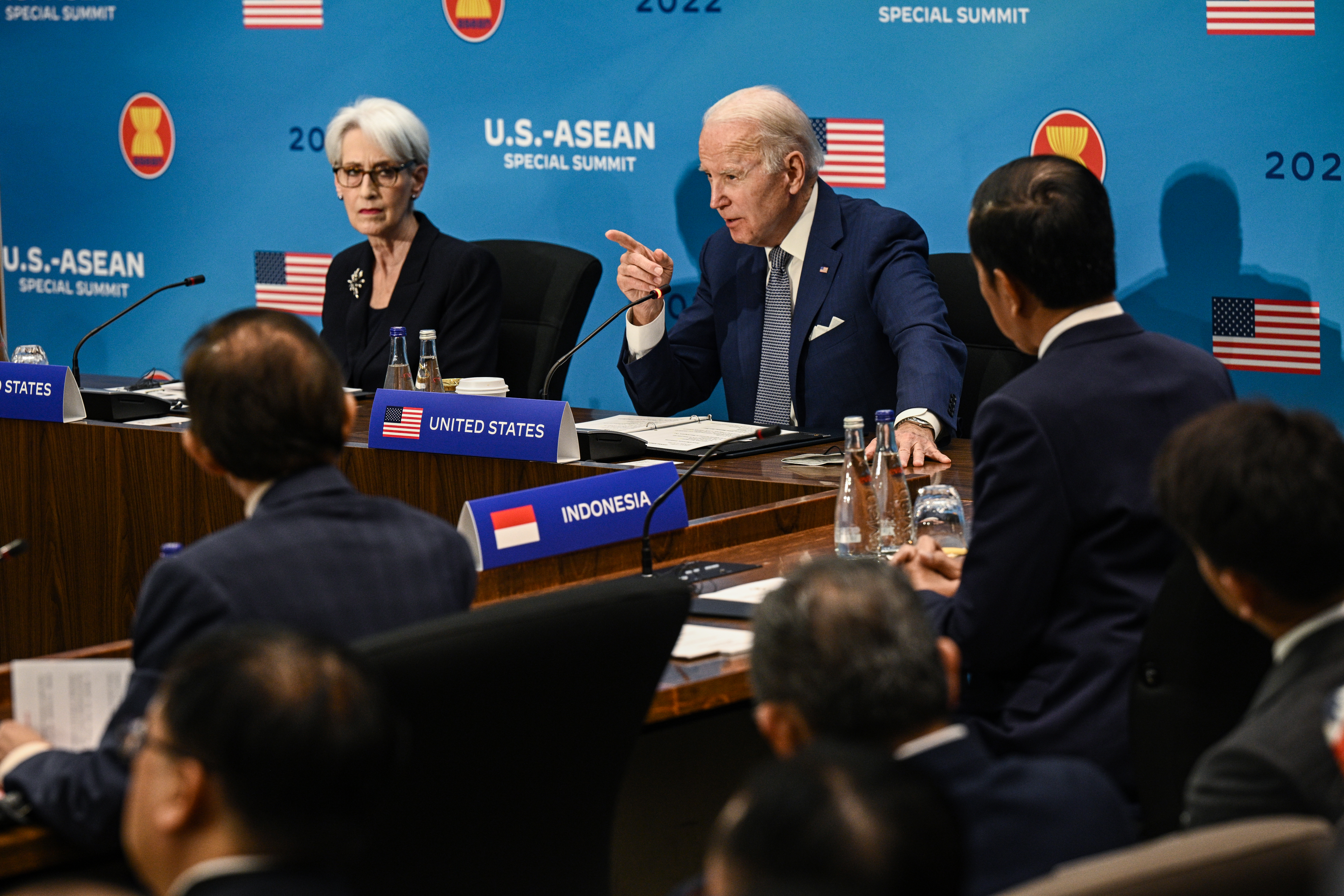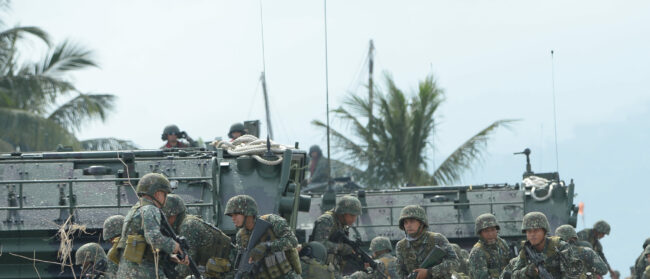Thai activist Porntin Say Yom and her neighbours fought more than 10 years to shut down a gold mine in northeast Thailand’s Loei province.
“We successfully closed the gold mine because we came together as a group to defend our rights,” Yom said.
But in late May, she joined hundreds of activists outside Bangkok’s United Nations office to protest another threat – a proposed law they fear will suppress freedom of association, especially for human rights activists.
The “Draft Act on the Operations of Not-for-Profit Organisations,” known colloquially as the NPO law, would allow the Thai government to exert unprecedented control over nonprofit groups, NGOs and activists say.
“They are keen to have the ability to pick out and go after any NGO they want,” said Phil Robertson, deputy director of Human Rights Watch Asia (HRW). “The reality is they can shut down almost anything if the law passes in its current form.”
An open letter signed by 65 Thai and international nonprofit organisations urged U.S. President Joe Biden to ask for the law to be scrapped when he met with Thai Prime Minister Prayuth Chan-o-cha during the 12-13 May ASEAN summit in Washington, D.C. The letter warned nonprofits will “face punitive action, including intrusive investigations, public threats, and ultimately orders from government authorities to end operations.”
The White House did not respond to a request for comment, but the U.S. State Department said it regularly encourages the Thai government to allow civil society to operate unimpeded. In its submission to the United Nations’ Universal Periodic Review of human rights in 2021, the U.S. requested a withdrawal of the NPO law.
Six U.S. senators led by Jeff Merkley and Ed Markey sent a letter in March to Thailand Minister of Foreign Affairs Dom Pramudwinai saying the law could hinder humanitarian aid for Myanmar refugees in Thailand. A second letter to U.S. Secretary of State Antony Blinken sought diplomatic action.
NGO leaders and Thai activists have argued the proposed law violates the freedom of expression and association enshrined in the Thai constitution and the International Covenant on Civil and Political rights.
The NPO law also would force organisations to disclose their funding and require advocacy groups to submit to burdensome bureaucratic processes or risk paying large fines, they said.
Activist leaders could be individually liable for violations of the NPO law by their organisations, triggering fines of 500,000 Thai baht (about $15,000).
A representative from the Ministry of Social Development and Human Security, which would oversee the NPO law, did not respond to requests for comment.

Since the military-led coup in 2014 which put General Prayut Chan-o-cha in power, freedom of association has been increasingly limited in Thailand. A wave of pro-democracy protests in recent years led to harsh crackdowns and motivated repressive legislation such as the NPO law, activists said.
Originally introduced in February 2021, the NPO law was revised in January but still contains worrisome provisions, according to the International Centre for Nonprofit Law. Whether additional changes will be made following a public comment period which ended in April remains unclear.
“We are afraid they [the government] will pass the law very soon,” said Pranom Somwong, a Thai activist with NGO Protection International. “They are not going to back down.”
The expansive definition of nonprofit organisations under the proposed NPO law encompasses virtually any group of private individuals, whether a book club or a rural activist collective, according to HRW’s Robertson.
All nonprofit groups would be prohibited from five vague and sweeping categories of activity, including anything affecting public interest, the government’s security and “the happy, normal existence of other persons” outlined in section 20 of the proposed statute.
“Every area of human rights work relates to the public interest,” said Amarin Saichan, an environmental legal rights lawyer at the Environmental Law Foundation, a Bangkok-based NGO. “This will be the problem for the Thai NPOs, we cannot know what we can do and when the law will be enforced on us to stop the operation.”
Thai Lawyers for Human Rights (TLHR), which represents pro-democracy activists, said the organisation’s work could be viewed as political activity prohibited by the NPO law.
“We are already perceived by some as ‘encouraging’ the political activists and movements, when we [represent them] to guarantee their access to justice and due process,” TLHR manager Sulakshana Lamubol said. “The authorities can use this bill to cease our operations if they perceive us to be supporting activities” in violation of the NPO law.
The government justified the proposed legislation as a method of transparency. Nonprofits would need to disclose all donors and are prohibited from using foreign funding to pursue “state power, or to facilitate or help political parties.”
The law would allow authorities to restrict NGO fundraising and give authorities “power to control how NGOs utilise their funds,” according to Emerlynne Gil, Amnesty International’s deputy regional director for research.
The government will know who they are, how many people there are and can go to attack anyone”
Sor Rattanamanee Polkla, founder of Community Resource Centre (CRC)
“There may be legitimate reasons for authorities to examine an association’s records to ensure transparency, public order and public safety,” Gil said. “But the Thai government should guarantee that the procedures followed are not arbitrary… as it would otherwise put the independence of associations and the safety of their members at risk.”
Restrictions surrounding foreign funding align with the Thai government’s framing of the pro-democracy movement as outside interference, noted Saichen of the Environmental Law Foundation, which he said receives funding from the U.S.-based National Endowment for Democracy and the Fund for Global Human Rights and could become a target under the law.
Sor Rattanamanee Polkla, founder of Bangkok-based Community Resource Centre (CRC), said foreign funding is essential for her nonprofit legal aid group to handle hundreds of cases.
“We need the support from outside the country,” she said. “It’s not easy to get the support to fund the community cases.”
Although the government nominally offers token funding to cover legal costs for activists, there is little financial support within Thailand for human rights work, Polkla explained.
Subsidies to use public transportation for court appearances are often inaccessible to rural activists, who require much more expensive private transportation services to reach court, she said.
Small activity groups might also be prevented from receiving funds due to extensive reporting requirements for donations and their specific uses.
Polkla is most concerned that the law’s sweeping prohibitions, ambiguous reporting requirements and steep penalties will impact small, grassroots activist groups and the informal networks linking NGOs and human rights defenders, which have limited resources and lack official registration as nonprofit entities.
“The government will know who they are, how many people there are and can go to attack anyone,” she said.
Under the NPO law’s Section 19, any group considered a nonprofit by the state must share details of its members, objectives and funding to a government-appointed registrar. The registrar would have the power to halt operations of nonprofits deemed to be withholding information.
“The problem is we are under an authoritarian regime,” said environmental activist Yom, whose community has been harassed by armed and masked militias. “We are afraid the government will use every bit of information they have in every possible way against us.”
Ratpracha Putnual, an organiser affiliated with the Southern Peasant Federation of Thailand, said that sharing details of membership and organising logistics endangers land rights activists already facing criminal charges and lethal threats from security forces. “It’s like turning ourselves in,” he said.
If the law were put in place, Putnual and Yom said their groups’ activism will likely move “underground.”
For now, activists believe raising their voices might shame the government into shelving the legislation. But the organising strategies being used to highlight the harms of the NPO bill could eventually be halted by penalties they might face under the law.
“That makes people fear, if I do something wrong do I need to pay?” said Kornkanok Wathanabhoom, an activist with Thai-based NGO Fortify Rights. “In the future, maybe they will not be gathering together, [because it will] be unfair and burdensome to their work.”


